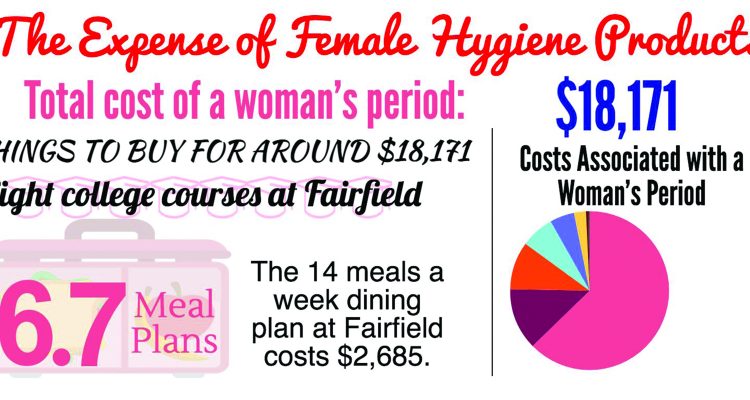On average, women spend $18,171 on feminine hygiene products in their lifetime.
The aforementioned statistic, provided by the Huffington Post, sheds light on the difficulties that many women face because of their periods each year. Fairfield University Student Association Senate, the American Association of University Women Fairfield chapter and Performing for Change are attempting to remedy that problem at Fairfield by petitioning that the University provide hygiene products to University women free of charge.
The initiative is not only happening at Fairfield. Beginning in September, free tampons and sanitary napkins could be found in all women’s, men’s and gender inclusive bathrooms in academic buildings at Brown University and in all campus bathrooms at Cornell University, according to the Huffington Post and the Daily Mail.
Junior at Cornell Daisy Zheng said, “I’ve been asked so many times if I had a tampon or pad that someone could borrow, so I think it’s great that they will now be provided free of charge to all students who need them.”
Performing for Change Co-President Kaadiana Barnes ‘17 explained how the initiative began at Fairfield.
“One of our members in Performing for Change had a concern about free feminine hygiene products and thought that we should do something about it, so we had the idea of writing notes on pads and then posting them in bathrooms. FUSA Senate also coincidentally put out a survey about the free feminine hygiene situation around the same time, so FUSA Senate connected with the American Association of University Women and Performing for Change, and we are going to have a meeting on [Oct. 28].”
Chair of the FUSA Senate committee Diversity of Inclusion Domonique Jackson ‘18 explained the initiative.
“The free feminine hygiene products is an initiative that aims to provide free feminine hygiene products in bathrooms around campus as an emergency resource,” she said. “In doing so, the initiative hopes to limit any potential factors that would inhibit a student’s ability to be fully present in the learning environment or undergo their daily Stag activities.”
The Diversity of Inclusion Committee is new this year and tackles issues involving class, gender, campus climate, cultural programming, the LGBTQ community, race, interfaith relations, commuter relations, disability and more.
“The goal of this committee is to be another solid resource for student concerns, especially those coming from a non-dominant narrative,” commented Jackson.
Speaker of the Senate Cara Gibbons ‘18 is working alongside the committee to implement the new initiative.
Gibbons spoke on the responses to the FUSA survey that was sent out earlier this year about hygiene products.
“Many students expressed that they do not always carry a feminine hygiene product on them and in the case of an emergency, they would not be prepared,” stated Gibbons. “In some instances, students would have to miss class, a meeting or alter their schedule for the day because of the unexpectancy that had occurred.”
Junior Tracy Le Beau agrees that unavailable products is a problem.
“[The initiative] gives girls less things to worry about,” she said. “You never know when you are going to need something. It’s just easier. We pay a lot of money to go to this school, so I think they should be able to help us out with that.”
However, some students believe that the products should only be provided to those who cannot afford them.
“If someone can’t financially purchase these things for themselves, then they should be given to them,” said Ruben Neves ‘17, “but if you are financially stable and you can afford these things and you need them, then you should pay for them yourself.”
According to AAUW President Shaquanna Raynor ‘18, “AAUW has been trying to create different programs to support the issue. Hopefully the University will see the efforts of multiple different organizations on campus and agree with what we are fighting for.”
According to Jackson, a framework is still being worked on to make the initiative feasible and sustainable.
“Right now, based on a price model created in committee, we are hoping to implement a trial period with free feminine hygiene products in the Barone Campus Center in the women’s bathroom closest to Einstein’s,” Jackson added. “Following the FUSA initiated poll, students reported that this is the bathroom they used most frequently. We’re hoping to run the trial for 1-2 months and, depending on the success of the trial, we will continue to push forward with long term implementation plans.”
According to Jackson, different campus partners offered to help support the project. The committee is hoping for companies to provide products to the school after learning about the initiative.
Gibbons spoke on the trial run of the initiative.
“It is important to remember that these products are to be solely for the purpose of an emergency in order for the individual to continue on with their day before returning home,” said Gibbons.
Barnes commented on the importance of the initiative.
“[These products] are really expensive,” Barnes said. “It’s very important that we help these young girls deal with these situations. It’s also important to have products accessible in the bathrooms because the machines either never work or they are empty.”
Barnes added, “There has to be some products in the bathrooms or in the Diversity Office, or in any comfortable space so [people] can grab them if they need them and it doesn’t have to be a taboo subject.”


Leave a Reply